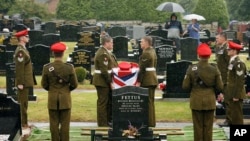LONDON —
The British government warned on Wednesday that future combat operations could become more difficult after a court ruled that families of three soldiers killed in Iraq could sue the military for failing to protect troops on active duty.
Britain's Supreme Court upheld the claim of relatives that the Human Rights Act applied to troops serving in battle abroad, and rejected the Ministry of Defense's argument that it was protected by a doctrine of combat immunity.
Under the doctrine, the government cannot be held responsible for actions or omissions that cause death or injury during combat.
The ruling delighted and surprised the families involved, but Defense Secretary Philip Hammond said that worrying about soldiers' human rights could have a serious impact on future military missions.
“I am very concerned at the wider implications of this judgment, which could ultimately make it more difficult for our troops to carry out operations and potentially throws open a wide range of military decisions to the uncertainty of litigation,'' Hammond said in a statement.
“It can't be right that troops on operations have to put the ECHR (European Court of Human Rights) ahead of what is operationally vital to protect our national security,'' he added.
Britain's top court, which overturned a decision by the Court of Appeal last year, ruled troops did remain under British jurisdiction when deployed on active service abroad and consequently were covered by the Human Rights Act.
The decision means families of soldiers killed can now take their cases to trial to seek damages from the MoD for negligence.
The claims related to the deaths of two British soldiers killed by improvised explosive devices while traveling in the heavily criticized, lightly armored Snatch Land Rover vehicles, and another who died in a “friendly fire'' incident.
Long battle
“It has been a long hard battle to get to this decision today and we now finally have permission to proceed and prove the MoD were at fault,'' said Susan Smith, whose son, Private Philip Hewett, was killed when his Snatch Land Rover was struck by an explosion in July 2005.
“They can no longer treat soldiers as sub-human with no rights,'' she said
Relatives of some British soldiers killed in action in Iraq and Afghanistan have blamed inadequate equipment for unnecessary deaths. Snatch Land Rovers have been particularly singled out, with critics arguing they gave too little or no protection from roadside bombs.
“Snatch Land Rovers were known to be inadequate for many years before the Iraq conflict. They were known to be unsafe and were becoming increasingly so as the insurgency grew and were nicknamed 'mobile coffins','' said the families' lawyer Jocelyn Cockburn.
“There seems to have been no intent to act upon the clear evidence regarding the safety of these vehicles,'' she added.
Britain's Supreme Court upheld the claim of relatives that the Human Rights Act applied to troops serving in battle abroad, and rejected the Ministry of Defense's argument that it was protected by a doctrine of combat immunity.
Under the doctrine, the government cannot be held responsible for actions or omissions that cause death or injury during combat.
The ruling delighted and surprised the families involved, but Defense Secretary Philip Hammond said that worrying about soldiers' human rights could have a serious impact on future military missions.
“I am very concerned at the wider implications of this judgment, which could ultimately make it more difficult for our troops to carry out operations and potentially throws open a wide range of military decisions to the uncertainty of litigation,'' Hammond said in a statement.
“It can't be right that troops on operations have to put the ECHR (European Court of Human Rights) ahead of what is operationally vital to protect our national security,'' he added.
Britain's top court, which overturned a decision by the Court of Appeal last year, ruled troops did remain under British jurisdiction when deployed on active service abroad and consequently were covered by the Human Rights Act.
The decision means families of soldiers killed can now take their cases to trial to seek damages from the MoD for negligence.
The claims related to the deaths of two British soldiers killed by improvised explosive devices while traveling in the heavily criticized, lightly armored Snatch Land Rover vehicles, and another who died in a “friendly fire'' incident.
Long battle
“It has been a long hard battle to get to this decision today and we now finally have permission to proceed and prove the MoD were at fault,'' said Susan Smith, whose son, Private Philip Hewett, was killed when his Snatch Land Rover was struck by an explosion in July 2005.
“They can no longer treat soldiers as sub-human with no rights,'' she said
Relatives of some British soldiers killed in action in Iraq and Afghanistan have blamed inadequate equipment for unnecessary deaths. Snatch Land Rovers have been particularly singled out, with critics arguing they gave too little or no protection from roadside bombs.
“Snatch Land Rovers were known to be inadequate for many years before the Iraq conflict. They were known to be unsafe and were becoming increasingly so as the insurgency grew and were nicknamed 'mobile coffins','' said the families' lawyer Jocelyn Cockburn.
“There seems to have been no intent to act upon the clear evidence regarding the safety of these vehicles,'' she added.








